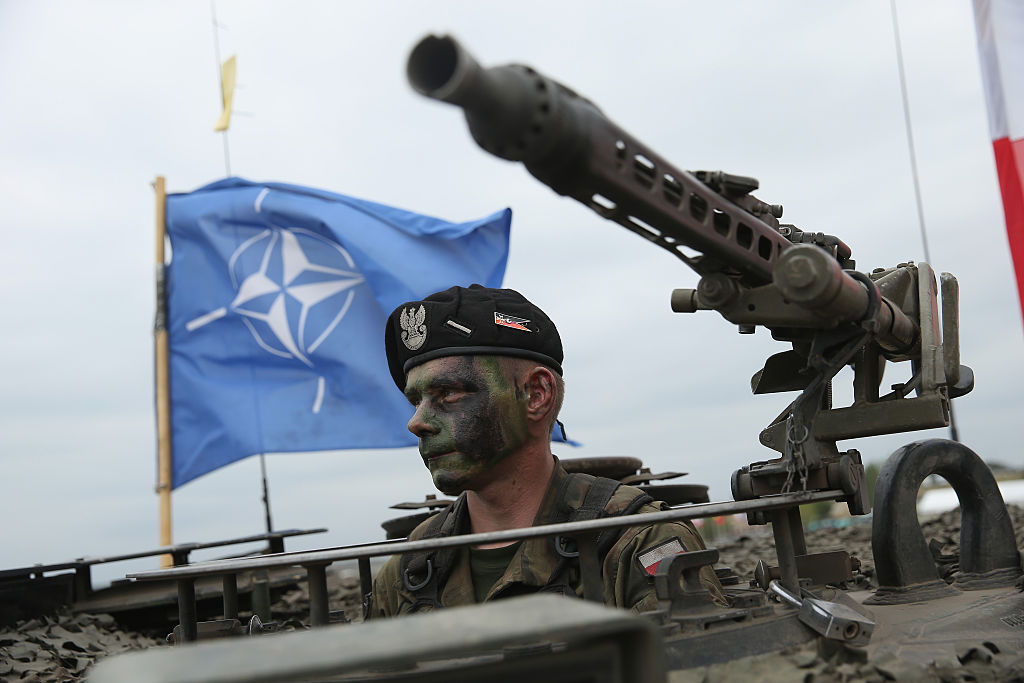On Monday, Nato kicked off its regular annual two-week nuclear drill, “Steadfast Noon”. It will include more than 60 aircraft from 13 countries and more than 2,000 personnel, in a bid to show the alliance’s preparedness.
In defence of the drill, Linas Linkevicius, the Lithuanian ambassador to Sweden, called it “a message to the greatest geopolitical maniac of the century.” He warned that Putin’s “nuclear bluff can and will have costs and consequences”.
If Putin really is a maniac who is ready to use nuclear force at a moment’s notice, why would a regular annual Nato drill deter him from escalation? And if on the other hand he is not a maniac and is just bluffing, then what “costs and consequences” can Nato inflict on Russia for its bluff? A drill certainly won’t inflict any.
Linkevicius’s comments provide a good illustration of the incessant tendency of Western diplomats to have their cake and eat it. Putin is simultaneously an irrational maniac who will cause a nuclear war at any moment and a leader who “bluffs” about responding harshly if certain Russian red lines are crossed. Putin is such a maniac that if not defeated in Ukraine he will go on to attack Nato and the Baltic states, probably causing a nuclear war. And yet he is such a feeble bluffer that he will not react if Nato sets out to defeat Russia in Ukraine. European diplomats can’t decide whether Putin will take action or not.
The truth is that there is only one scenario, other than a direct attack on or blockade of Russian territory, that would bring Russia to — or over — the brink of using a nuclear weapon: the prospect of outright defeat in Ukraine, which is unlikely.
As CIA Director William Burns has revealed, the only time that his agency was really worried about Kremlin nuclear escalation was in the autumn of 2022, when Russian forces had been driven out of Kharkiv and were in danger of being surrounded and crushed in Kherson. Really, though, Putin did not escalate but ordered a tactical retreat from Kherson.
Since then, however, Russia has fought Ukrainian offensives to a standstill, and is pushing forward — albeit slowly and with heavy casualties — in eastern Ukraine. There is a risk that the Ukrainian front will at some point break completely. In this event, a panicked West might decide to send troops or planes to Ukraine, triggering a direct war with Russia. It is this eventuality that Russian nuclear sabre-rattling is meant to deter.
It is true that in 2023 there was a public debate in Russia on the preventive use of nuclear weapons in a first strike. However, the proponents of this position have been roundly condemned by a majority of the Russian establishment, and Putin himself rejected the notion. “It is certainly theoretically possible to use nuclear weapons this way,” he said last year. But failing a serious threat to the existence of the Russian state, “we see no need to use it.”
This is not wholly dissimilar to the debate in the West. Certain elements have advocated Western troops for Ukraine, or a Nato “no-fly zone” over Ukraine. In other words, some argue that Nato should serve as Ukraine’s de facto infantry and air force, but the Biden administration and most of the alliance’s member states have categorically rejected this suggestion.
No doubt, this week’s Nato drill comes at a time of heightened tension, when Putin has been publicly mulling over Russia’s nuclear policy. But both the West and Russia recognise that escalation towards a real danger of nuclear war would be an act of unspeakable folly, and that, in Ronald Reagan’s words, a nuclear war “cannot be won and must never be fought”. All the same, it would be a good idea if some Western officials remembered that diplomats are supposed to be diplomatic, and that brainless, genetically-programmed tweeting should be strictly for the birds.











Join the discussion
Join like minded readers that support our journalism by becoming a paid subscriber
To join the discussion in the comments, become a paid subscriber.
Join like minded readers that support our journalism, read unlimited articles and enjoy other subscriber-only benefits.
Subscribe